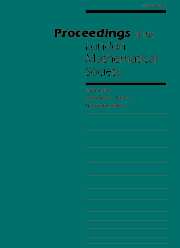Article contents
Invariant subspaces for spherical contractions
Published online by Cambridge University Press: 01 July 1997
Abstract
Let $T$ be a contraction on a complex Hilbertspace $H$. A result of Brown, Chevreau and Pearcy from 1979 shows that $T$ has a non-trivial invariant subspace if the spectrum of $T$ is dominating in the open unit disc. It is the purpose of the present paper to prove the multidimensional analogue of this result for spherical contractions $T \in L(H)^n$ that possess a sphericaldilation and for which the Harte spectrum is dominating inthe open unit ball $B$ in $\mathbb{C}^n$. If even the essential Harte spectrum of $T$ is dominating in $B$, then $T$ is shown to be reflexive and to possess an extremely rich invariant subspace lattice. The proof is based on the existence of an $H^{\infty}$-functional calculus for completely non-unitary spherical contractions and on a multidimensional analogue of the classical result of Sz.Nagy and Foias, stating that each spherical contraction which is neither of type $C_{\cdot 0}$ nor of type $C_{0 \cdot}$ and which does not consist of multiples of the identity operator on $H$, possesses non-trivial joint hyperinvariant subspaces.
1991 Mathematics Subject Classification: 47A13, 47A15, 47A60
Information
- Type
- Research Article
- Information
- Copyright
- London Mathematical Society 1997
- 11
- Cited by

